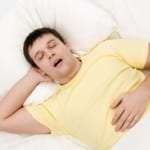 Even an isolated bad night can leave you feeling tired and lethargic for days. If you regularly struggle with sleep, this can have serious implications for your physical and mental health. Sleep apnoea is a potentially severe sleep disorder, which can contribute to disturbed nights of sleep for you and those around you. If you’re worried about sleep apnoea or you frequently find yourself experiencing breathing difficulties during the night, we may be able to help.
Even an isolated bad night can leave you feeling tired and lethargic for days. If you regularly struggle with sleep, this can have serious implications for your physical and mental health. Sleep apnoea is a potentially severe sleep disorder, which can contribute to disturbed nights of sleep for you and those around you. If you’re worried about sleep apnoea or you frequently find yourself experiencing breathing difficulties during the night, we may be able to help.
Spotting the signs of sleep apnoea
Sleep apnoea is not the same as snoring, but heavy and frequent snoring can be a symptom of sleep apnoea. Apnoea is characterised by episodes of interrupted breathing, which occur as a result of the airways becoming blocked. Apnoea is defined by episodes that last 10 seconds or longer.
In addition to loud, heavy breathing, sleep apnoea may also cause gasping for breath and repeated snorting.
How we can help
In milder cases of sleep apnoea, we may be able to help restore peace and quiet to your bedroom by providing custom-designed devices that help to keep the airways open while you sleep. We fit the device to ensure that it is comfortable and then schedule follow-up appointments to see how you’re getting on.
We can also offer advice about lifestyle changes that may help to prevent snoring and sleep apnoea, such as giving up smoking, losing weight by adopting a healthy eating and exercise plan and changing your sleeping position.
In more severe cases, it may be necessary to employ more intensive treatment, such as wearing a breathing mask at night and you will be advised to seek medical advice from your GP.
If you would like advice about snoring or sleep apnoea or you’re worried about disrupted sleep patterns, call us today and arrange a consultation.









